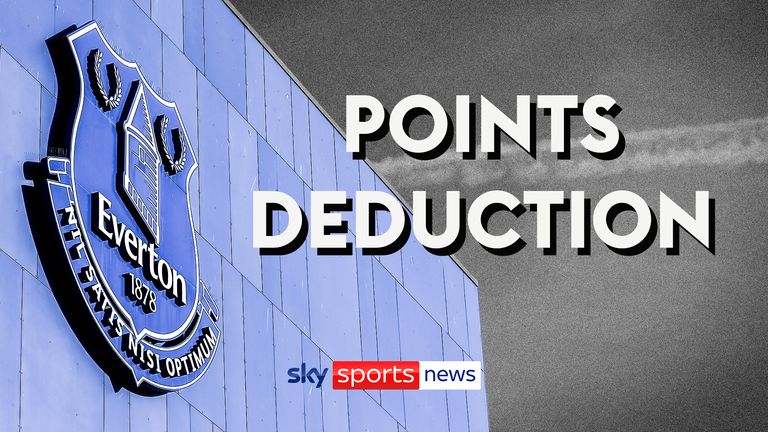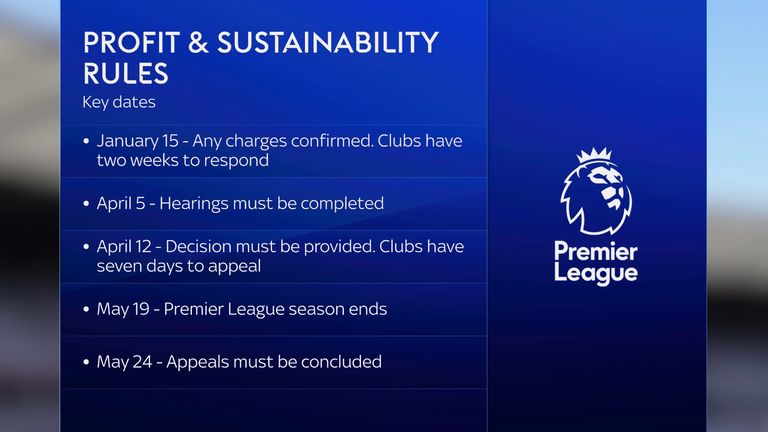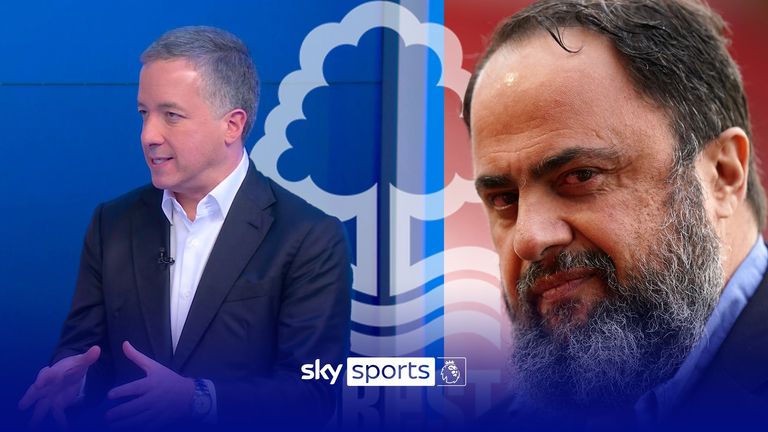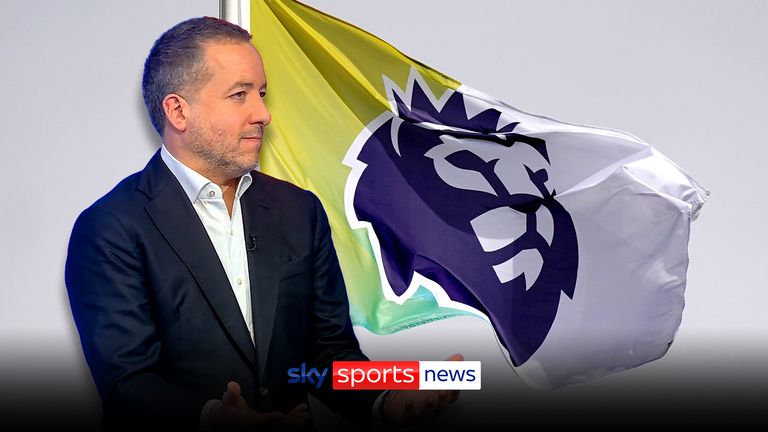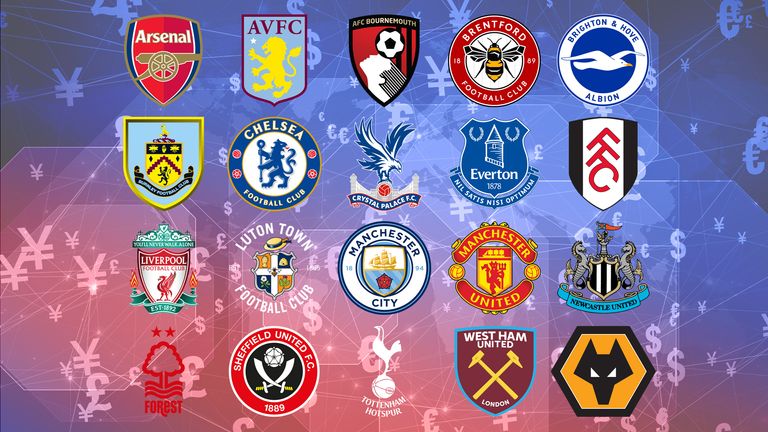Profit and Sustainability Rules: Premier League points deductions here to stay for financial breaches
Clubs who break Profit and Sustainability Rules (PSR) can expect to continue to be sanctioned via points deductions; Everton and Nottingham Forest have both been docked points for respective breaches; the idea of a new "luxury tax" is not under consideration by PL
Thursday 11 April 2024 15:49, UK
Clubs who break the Premier League’s financial rules can still expect to be given significant points deductions in the future, despite a proposal to replace points penalties with a fine.
At the latest shareholders meeting of Premier League clubs on Thursday, the future of squad cost controls was one of a number of key issues on the agenda.
And in principle, they agreed to introduce new financial rules. It would likely mean clubs will be limited to spending 85 per cent of their revenue on transfers, wages and agents' fees.
Clubs voted to progress with new squad cost ratio rules to replace current Profitability and Sustainability Rules (PSR). Two votes were on proposed new rules, and one was unanimous. A final vote on whether to adopt new rules will be taken at the Premier League's AGM in June.
- PSR explained: What limits clubs spending more?
- Everton hit with new points deduction
- Stream the Premier League and more with NOW
PSR rules will still be in place for next season. If new rules are adopted at the AGM, there would be a transition period next season where the new rules would shadow current PSR rules.
Trending
- Man City latest: Gundogan offers brutal assessment after latest loss
- Papers: Wilcox steps into Ashworth's Man Utd role ahead of Jan window
- Transfer Centre LIVE! Van Dijk: 'No word' on Liverpool contract talks
- Arsenal latest: Lewis-Skelly has bright future, says Arteta
- Arsenal 3-0 Monaco reaction
- Why exact league place matters in the Champions League table
- Verdict on 'predictable' Man City: 'If I was Amorim, I'd copy Juve'
- Man Utd latest: Talks opened for Paraguayan teenager Leon
- Live Champions League table: Man City sink to 22nd place
- Rashford among Man Utd stars available for transfer
But perhaps crucially, the sanction of points deductions will remain for next season and will also remain as part of the new squad cost ratio rules.
The Premier League said after the last meeting in March that they were committed to "prioritise the swift development and implementation of a new league-wide financial system".
Everton's appeal against their latest points deduction may not be concluded until the week after the end of the Premier League season - May 25 at the latest - leading to the potentially chaotic situation whereby clubs don't know who will be relegated, even when they have completed all matches.
As a result, the timescale for the new punishments was also a key issue on the agenda of the shareholders meeting, although this is a difficult problem to solve. Previously, financial breaches reported in one financial year were punished in the following year, but this led to criticism that clubs weren't being sanctioned quickly enough.
For the start of this season, the Premier League clubs voted to introduce a new 'fast-track' system whereby clubs are punished in the same season in which they breach. However, that has led to the current problems, whereby points deductions may not be clarified until after the season has finished.
Reports elsewhere had suggested a new 'luxury tax' was being considered, whereby clubs who breach the spending rules will be given a hefty fine, which increases depending on the level of the breach. The proceeds of those fines would then be distributed among the clubs who had complied with the laws.
Sky Sports News has been told there was support for such a scheme among some large and small Premier League clubs, but the majority - and the Premier League itself - are adamant that idea is a non-starter.
The fear is that it could lead to the wealthiest clubs spending huge sums on players without limit, and even though this might benefit the smaller clubs financially, via the fines, it would increase disparities between clubs, and could lead to huge player wage and transfer fee inflation.
As a result, Sky Sports News understand a 'luxury tax' was not on the agenda.
What is at the centre of the discussion, however, is how best to align the new Premier League rules with those already introduced by UEFA.
By season 2025/26, clubs involved in European competitions will only be allowed to spend 70 per cent of their total income on players (the limit is currently 90 per cent which, as part of a staged introduction, will be reduced to 80 per cent next season).
The new Premier League rules are likely to allow clubs not involved in Europe the freedom to spend more than 70 per cent of their income on players, in order to help them compete. But the level at which the cap will be set is still to be decided.
The theory is that the biggest clubs already have two significant, separate streams of revenue - from UEFA and from the Premier League - whereas those clubs outside European competition have only one.
Setting the spending limit above 70 per cent would allow those smaller clubs to try to compete more effectively with the bigger clubs, while those involved in European football, with bigger incomes, would still have to stick to UEFA's 70 per cent limit.
PSR explained: What limits clubs spending more?
In the simplest terms, when every Premier League team tots up their annual accounts, they can have made a loss no greater than £105m across the previous three seasons.
Clubs can only lose £15m of their own money across those three years. So that's no more than £15m extra on outgoings like transfer fees, player wages and, in a lot of clubs' cases, paying off former managers compared to their income from TV payments, season tickets, selling players and so on.
The other £90m of any £105m must be guaranteed by their owners buying up shares, known as 'secure funding', and essentially means bankrolling the club.

